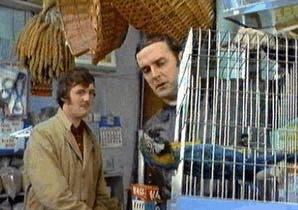
Dead Parrot Sketch Is 1,600 Years Old 276
laejoh writes "Monty Python's 'Dead Parrot sketch' — which featured John Cleese — is some 1,600 years old.
A classic scholar has proved the point, by unearthing a Greek version of the world-famous piece.
A comedy duo called Hierocles and Philagrius told the original version, only rather than a parrot they used a slave.
It concerns a man who complains to his friend that he was sold a slave who dies in his service.
His companion replies: 'When he was with me, he never did any such thing!'
The joke was discovered in a collection of 265 jokes called Philogelos: The Laugh Addict, which dates from the fourth century AD.
Hierocles had gone to meet his maker, and Philagrius had certainly ceased to be, long before John Cleese and Michael Palin reinvented the yarn in 1969."



Re:Classics, not just stuffy rhetoric or dull hist (Score:3, Insightful)
Re:The Best of Hierocles and Philagrius (Score:4, Insightful)
So... that book is dated 1920. Is there any actual news here, or did some guy just finally connected the gag to the dead parrot sketch and report it to that distinguished journal, The Telegraph?
Not the same joke (Score:5, Insightful)
Umm, those aren't the same joke at all. Just because they both involve selling and dying doesn't mean that they're the same joke. The premise of the older joke is that the man who sold the slave is saying something in a surprised manner which is obviously true. The contrast is between his surprise and the understanding of the audience for the joke that he shouldn't be surprised (since obviously the slave hadn't died before he sold it).
The joke in the Monty Python sketch is that the parrot was dead when it was sold. The humor comes from the absurdness of the idea that someone could be sold a dead parrot without realizing it. The joke is furthered by the sales clerk's obviously futile attempts to claim that the parrot isn't dead and the colorful language used to attempt to convince the clerk that the parrot is dead. This is not at all the same joke. The premise is completely different, as is the type of humor involved. The Greek one is ironic humor. The Monty Python one is absurdist humor.
Re:Classics, not just stuffy rhetoric or dull hist (Score:3, Insightful)
Also: 60s pop music was a lot more than the 50 or so songs that have been endlessly repeated on your local classic rock station and in movie soundtracks.
We think we have a memory of decades from before we were born, but we just have some editor's sleezy commercial take on the time. Really getting something approximating a feel for another time takes actual work and research.
Re:Classics, not just stuffy rhetoric or dull hist (Score:3, Insightful)
How about a few links then? Learning ancient Greek so I can digging through historical liturature ain't on my bucket list.
Re:Classics, not just stuffy rhetoric or dull hist (Score:1, Insightful)
the 60's are typically considered the time when the current style of let's say impure humor began.
If you believe that, I have a humorous assortment of bridges to sell you.
Off color humor has always had a following, it's just that, from Victorian times until recently, the lettered public would never admit to such a thing, let alone allow it to be said in mixed company (e.g., when ladies were present). You can bet money that bawdy jokebooks were passed around behind closed doors at the private men's clubs, though. Also, you'd probably be able to find coarse language and crude humor wherever the "lower class" gathered as well - it's just that "those sorts of people" would never be let near something as dignified as literature, radio or television. (What if an impressionable young woman heard?)
That said, you don't have to dig very deep to find it, if you're looking. Heck, Shakespeare is a great source for double entendre, insults, and all manner of "impure humor". "The bawdy hand of the dial is now upon the prick of noon", anyone? We recently had a story where they revealed that the world's oldest recorded joke [slashdot.org] was a fart-joke.
Re:What's worse... (Score:5, Insightful)
Isn't that the definition of comedy?
Re:so that's what killed it (Score:2, Insightful)
Not the same joke at all (Score:5, Insightful)
The punchline of the original joke was that the slave had never done that sort of thing before...likening the death of the slave to simple disobedience or other unpleasant but recurring behavior a slave might have.
In the monty python sketch....there was no punchline (as they had a distaste for punchlines). And further, the premise is that the bird was dead when it was sold, which should have been obvious at the time...though you also have the shopkeeper insisting that the parrot is still alive even though it is obviously dead.
These two sketches are not related at all, IMO, let alone "the same joke." They are just a bit similar in that one person owns something that is dead, and wants his money back.
Re:dead? (Score:3, Insightful)
You must be new around here.
Re:Not the same joke (Score:3, Insightful)
Ok, but did you see the Monty Python sketch where the elitist Brit trashes American cult humor in a way that smacks of "I knew the band before they made the big time and sold out"?